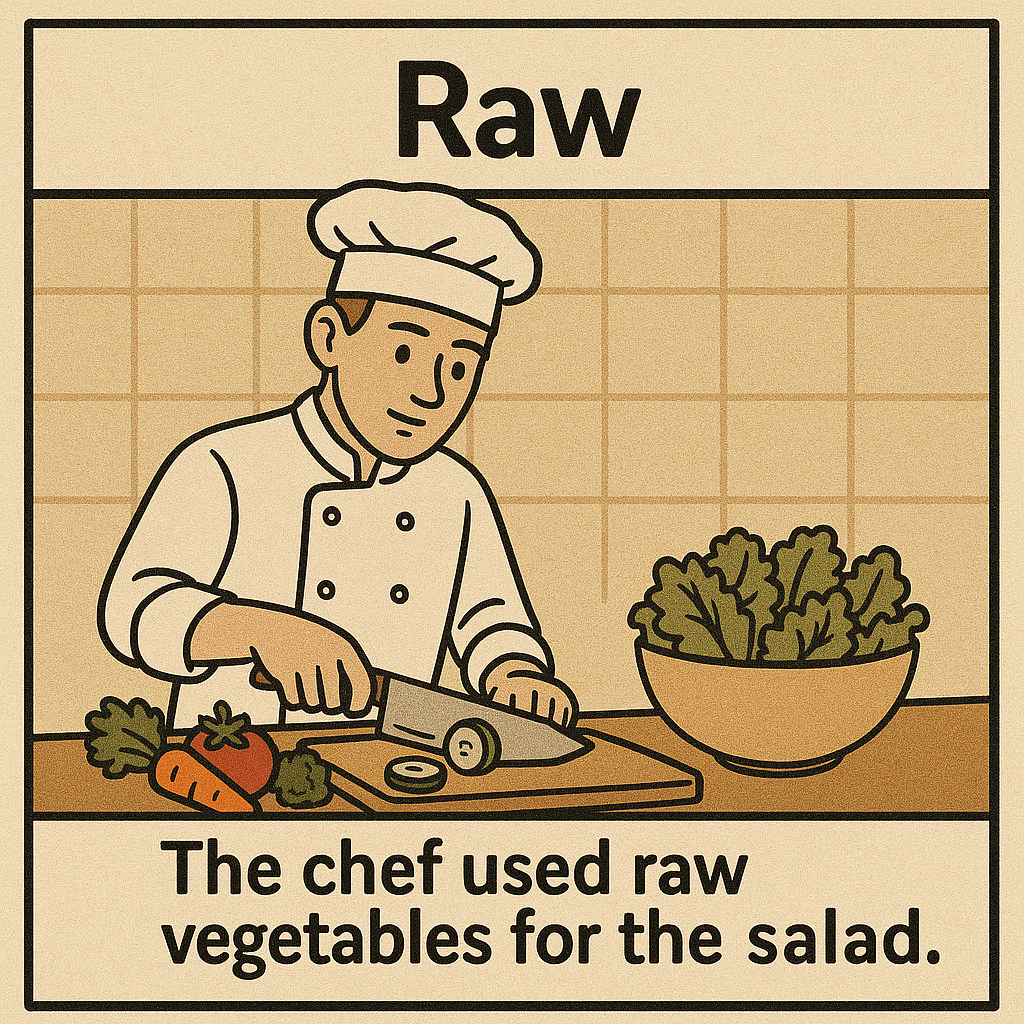Raw
Definition
The term "raw" describes something in its natural, unprocessed state or lacking refinement.
Parts of Speech
- Adjective
Pronunciation
American English
- IPA Pronunciation: /rɔː/
- Respelling: RAW
British English
- IPA Pronunciation: /rɔː/
- Respelling: RAW
Etymology
The word "raw" originates from the Old English "hrēaw," meaning "uncooked" or "unprocessed." It is derived from Proto-Germanic "*hrawaz" and Proto-Indo-European "*kreuh-" (raw flesh or bloody). Related words are found in Old Norse "hrá," Dutch "rauw," and German "roh."
Derivatives
- Rawness (noun)
- Rawly (adverb)
- Rawhide (noun)
- Rawboned (adjective)
- Unraw (adjective, rare)
Synonyms
- Uncooked
- Unrefined
- Natural
Antonyms
- Cooked
- Processed
- Refined
Usage
The term "raw" is used in contexts such as food, materials, and emotions. For example, "The fish was served raw as sashimi" or "He expressed his raw feelings during the interview."
Related Terms
- Natural: Existing in or derived from nature; not made or processed by humans.
- Primitive: Relating to an early stage of development.
- Rough: Having an uneven or unpolished surface or state.
Detailed Definitions
Adjective
- In a natural or unprocessed state: Refers to something that has not been altered, cooked, or refined.
- Example: "The chef used raw vegetables for the salad."
- Lacking refinement or polish: Refers to something crude or unfinished.
- Example: "The manuscript was in its raw form, requiring editing."
- Emotionally intense or exposed: Refers to feelings or experiences that are vivid or unguarded.
- Example: "The film captured the raw emotions of loss."
- Cold and damp (weather): Refers to unpleasantly chilly or moist atmospheric conditions.
- Example: "The hikers braved the raw winter winds."
raw



🇨🇳 Mandarin
- 生 (shēng) - materials in a natural state
- IPA Pronunciation: /ʂəŋ/
- English Respelling: shung
- 原始的 (yuánshǐ de) - intensely felt and perhaps painful
- IPA Pronunciation: /yɛn˨˩ʂɨ˥˩ dɤ˥˩/
- English Respelling: yuan-shee duh
🇮🇳 Hindi
- कच्चा (kachchā) - materials in a natural state
- IPA Pronunciation: /kʌtʃːaː/
- English Respelling: kuh-chaa
- अपक्षित (apakṣit) - intensely felt and perhaps painful
- IPA Pronunciation: /əpəkʂɪt/
- English Respelling: apakshit
🇪🇸 Spanish
- Crudo - materials in a natural state
- IPA Pronunciation: /ˈkɾudo/
- English Respelling: kroo-doh
- Descarnado - intensely felt and perhaps painful
- IPA Pronunciation: /deskarnaˈdo/
- English Respelling: deskar-nado
🇫🇷 French
- Cru - materials in a natural state
- IPA Pronunciation: /kʁy/
- English Respelling: kru
- Brut - intensely felt and perhaps painful
- IPA Pronunciation: /bʁyt/
- English Respelling: brut
🇸🇦 Modern Standard Arabic
- خام (khaam) - materials in a natural state
- IPA Pronunciation: /xaːm/
- English Respelling: khaam
- قاسٍ (qaasin) - intensely felt and perhaps painful
- IPA Pronunciation: /qaːsin/
- English Respelling: kaasin
🇧🇩 Bengali
- কাঁচা (kāṁcā) - materials in a natural state
- IPA Pronunciation: /kãtʃa/
- English Respelling: kancha
- অপরিপক্ব (aparipakva) - intensely felt and perhaps painful
- IPA Pronunciation: /ɔporipɔkko/
- English Respelling: opori-pokkho
🇷🇺 Russian
- Сырой (syroy) - materials in a natural state
- IPA Pronunciation: /sɨrɐj/
- English Respelling: suh-ro-y
- Живой (zhivoy) - intensely felt and perhaps painful
- IPA Pronunciation: /ʐɨˈvoj/
- English Respelling: zhee-voy
🇵🇹 Portuguese
- Cru - materials in a natural state
- IPA Pronunciation: /ˈkɾu/
- English Respelling: kroo
- Bruto - intensely felt and perhaps painful
- IPA Pronunciation: /ˈbɾutu/
- English Respelling: broo-to
🇮🇩 Indonesian
- Mentah - materials in a natural state
- IPA Pronunciation: /məntah/
- English Respelling: men-tah
- Kasar - intensely felt and perhaps painful
- IPA Pronunciation: /kasar/
- English Respelling: ka-sar
🇩🇪 German
- Roh - materials in a natural state
- IPA Pronunciation: /roː/
- English Respelling: roh
- Unverarbeitet - intensely felt and perhaps painful
- IPA Pronunciation: /ʊnfɛɐ̯ˈʔaɐ̯baɪ̯tət/
- English Respelling: un-fer-ar-bite-tet
🇯🇵 Japanese
- 生 (nama) - uncooked
- IPA Pronunciation: /nama/
- English Respelling: nah-mah
- 素材 (sozai) - in a natural, unprocessed, or untreated state
- IPA Pronunciation: /sozai/
- English Respelling: so-zai
🇻🇳 Vietnamese
- Sống - uncooked
- IPA Pronunciation: /soŋ˧ˀ˨ʔ/
- English Respelling: song
- Nguyên liệu - in a natural, unprocessed, or untreated state
- IPA Pronunciation: /ŋwiən˧ˀ˨ʔ liəw˧ˀ˨ʔ/
- English Respelling: nguyen lieu
🇰🇷 Korean
- 생 (saeng) - uncooked
- IPA Pronunciation: /sʰɛŋ/
- English Respelling: sehng
- 원료 (wonryo) - in a natural, unprocessed, or untreated state
- IPA Pronunciation: /wʌnɾjo/
- English Respelling: won-ryo
🇹🇷 Turkish
- Çiğ - uncooked
- IPA Pronunciation: /tʃiː/
- English Respelling: chee
- Ham - in a natural, unprocessed, or untreated state
- IPA Pronunciation: /ham/
- English Respelling: hahm
🇵🇰 Urdu
- خام (khaam) - uncooked
- IPA Pronunciation: /xɑːm/
- English Respelling: khaam
- غیر معالج (ghair mu'ālaj) - in a natural, unprocessed, or untreated state
- IPA Pronunciation: /ɣɛːr mu.ɑː.ləd͡ʒ/
- English Respelling: gha-ir moo-a-laj





